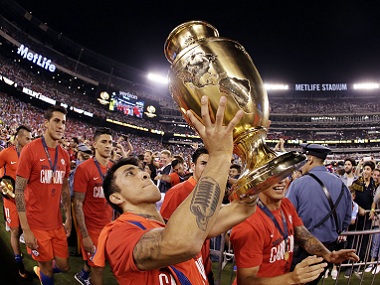Chile lies on a narrow strip to the west of Argentina, making them uncomfortable bedfellows joined at the waist by geography but separated through a history of mistrust surrounding their conflicting claims over Patagonia. As the Chileans dance deep into the night, relishing a triumphant Copa America Centenario campaign, they will be nudging their grieving neighbours with their heaving hips, rubbing salt into Argentine wounds. Their successful Copa America title defence marks the beginning of a bright new chapter in the story of Chilean football. The government has declared a public holiday on Monday, so revelers can fill the streets of Santiago and elsewhere, drenching the country with their spirited celebrations. La Roja fans will let it all flow, expressing their joy through fire crackers and festivities, music, drink and dancing long into the night. Life has come a full circle for La Roja, who were unceremoniously kept out of the 1990 and 1994 World Cup competitions for unsportsmanlike behaviour. The “Maracanazo”, as they termed the incident involving their goalkeeper at the time, Roberto Rojas, brought Chile widespread disrepute across the world. [caption id=“attachment_2858060” align=“alignleft” width=“380”]  Chile’s victorious players with the Copa America trophy. AP[/caption] More than two decades after that ugly incident, Chile seems ready to move on and script a fresh new chapter in their football. Over the past two years, the team has shown brawn and brain in equal measure to impose themselves on the global landscape of football. By winning the Copa America twice in a row, they have finally managed to walk firmly out of the giant shadows cast by their formidable Brazilian and Argentine counterparts. Chile has perhaps done enough to stake its claim as one of the most eminent South American exponents of the beautiful game. Copper-rich Chile has a strong mining tradition and the culture of the football team has been defined by its rugged, unbridled style of play. They push forward with conviction and pace, just as well as they rattle opponents with a physically imposing form of defense, putting their bodies on the line. Juan Antonio Pizzi has taken over a team of hesitant winners and turned them into confident warriors. Pizzi is a Spanish international born in Argentina. His experience straddles Europe and South America, providing the rich cultural ingredients needed to turn the unit into a winning combination. An opening defeat to start their title defense may have rattled several other teams, but that 1-2 loss to Argentina was brushed aside by this Chile team like it never happened. Bursting out of the gates like a fighting bull, they have played the game with remarkable energy through these last two years. Eduardo Vargas and Alexis Sanchez, both in their mid-20s and at the peak of their powers, have been pressing forward with great freedom. They are being supported exceptionally well by Arturo Vidal and Marcelo Diaz, the latter breaking up the flow of play with his physically expressive style of play. Claudio Bravo is a solid presence in the goal, emboldened by the solid defensive skills of a four-man lineup marshalled by the experienced Gary Medel. The stocky 28-year-old has been key to their success this season, with his commitment rubbing off on his fellow defenders. Medel and Gonzalo Jara have become a formidable centre-back pairing with the ability to lock down the best of forwards. With resources like that, Pizzi has been able to instill a deep rooted winners mindset into the team. That has helped Chile withstand an early defeat to Argentina and come back stronger from it. The fact that they have scored 16 goals in five matches leading to the final underlines the attacking instinct with they have approached this Copa America. With most of the team still in their 20s, they could yet remain a formidable force by the time the football circus reaches Russia for the World Cup in 2018. The Copa America has been a solid platform to make a statement. A good showing in the World Cup, where they have struggled to get past the second round most of the time, will redefine their position. It will be an interesting story to read if they retain their vigour and polish their rough edges. Chile clearly have the raw materials to challenge the best in international football. However, they could use a few lessons in civility and manners. That perhaps will be the biggest challenge for Pizzi and his mercenary band of footballers.
The Copa America has been a solid platform for Chile to make a statement. A good showing in the World Cup, where they have struggled to shine, will redefine this position
Advertisement
End of Article


)

)
)
)
)
)
)
)
)



